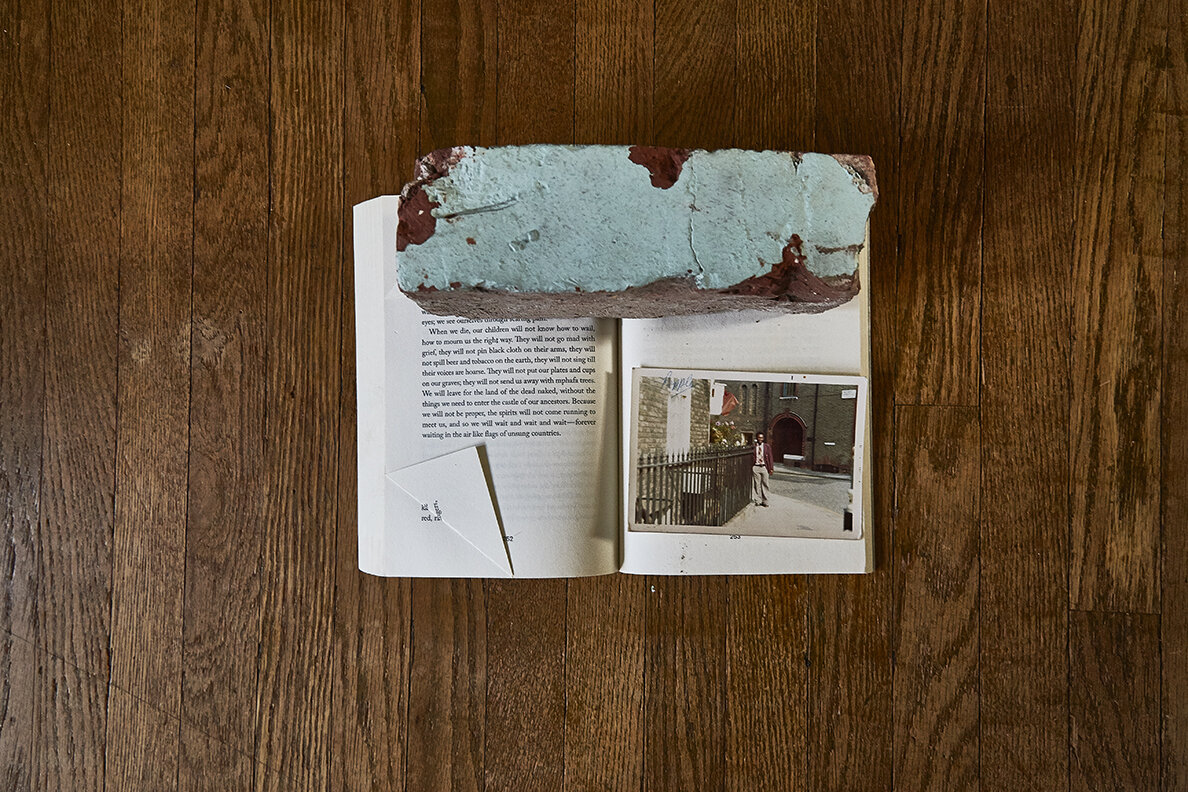Liz Ikiriko, Homegoing I, 2017, digital C-print. Photo: courtesy of the artist.
Flags of Unsung Countries charts artist Liz Ikiriko’s process to understand her father’s struggles as an African immigrant challenged with mental illness living in the Canadian prairies. The work asks several questions: What is required of a home? Do we choose to belong or does belonging choose us? Flags of Unsung Countries uses photography to map a path of the African diaspora. Ikiriko’s deeply personal and moving work explores memory, family and identity, and reimagines boundaries between past and present.
Artist ↑
Essay by Nehal El-Hadi
The diaspora is a place of no fixed location, no solid earth. Belonging, for the immigrant, is predicated on the surrender of home. The departure or flight, the moving away from home, means that the immigrant’s demands for belonging are undermined by previous choices or rejections. What right does the immigrant have to an elsewhere? Our relationship to belonging is tenuous at the best of times. The slow and continuous loss of memory, legacy, ritual is the constant bleeding once the pound of flesh is paid.
Memorialising is an insistence on something more than survival, more than the acknowledgment of existence. Rituals of remembrance are an adaptation strategy, a necessary evolution—a way to manage the need for belonging contrasted with the desire for homeland.
In her doctoral dissertation, English professor Karina Vernon writes that “the struggle for memory against the willful forgetting of black history at once constitutes and conserves the poetics of the black prairies.” Here, in Liz Ikiriko’s Flags of Unsung Countries, this struggle for memory produces a visual poetics constituted through gathered objects, recollections, and re-presentations of a Black woman in—and also of—the prairies. Of a daughter’s lived experiences and memories contending with the variegated absences of her late father. Of landscapes and language.
In one photograph, Ikiriko sits in the backyard of a nondescript home in Saskatoon, surrounded by the eerie light of a solar eclipse, having collected her father’s ashes. This is a pivotal moment in Ikiriko’s transformative journey: this is when and where the personal, intrinsic value of belonging is revealed through a new understanding of togetherness. The tropology of Ikiriko’s imagery reveals an uncanny commentary on home and family, disrupting an assumed familiarity in several ways. First, through the personal objects turned totems by the literal quest for her father’s home, and by arranging and documenting these fragments of ritual, whether family photograph or handwoven cloth. Second, by foregrounding Saskatchewan as site, Ikiriko challenges the “willful forgetting” of a particular Black Canadian experience. And related to this, through the lens of personal memory, Ikiriko presents together Nigerian and Canadian backdrops, reminding the viewer that both of these landscapes—along with their histories—are reflected in the topography of her own person.
Immigrant nostalgia is the wellspring from which the desire for a homeland is watered. Ikiriko’s cousin, the poet Ibiwari Ikiriko, writes in “Baseless Compass”: “Hope leaks out/From our insides/Leaving us empty/As a basket of water.” This kenophobia finds a suitable backdrop in the massive, empty skies of the prairies that induce a compulsive need to insist on the Black life in and belonging to Saskatchewan. At the same time, it is this massive expanse of sky that contain the possibility of eventual belonging if not to a place, then to a time, as the poet Daniel Scott Tysdal points out, “The sky is not a shape but a duration.”
In Flags of Unsung Countries, the struggle for memory generates its own testimonies.
Nehal El-Hadi is a writer and researcher whose work explores the relationships between technology, the body, and space. She is based in Toronto, where she is currently a Visiting Scholar at the City Institute at York University. She tweets @iamnehal.
Installation Images ↑
Photos by Don Hall












